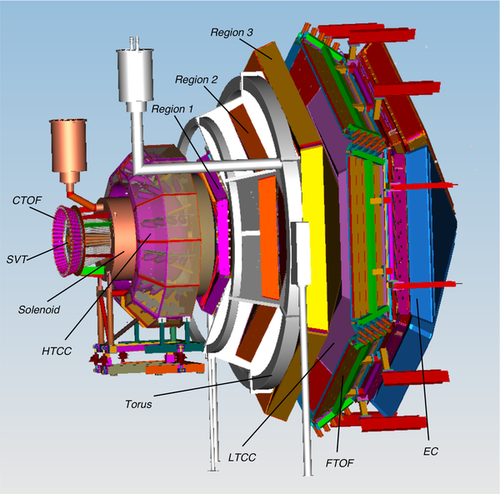Run Group M
- Shift Documentation
- Phone Numbers
- Short Term Schedule
- Notes/Known Issues
- Shift Expert
- Remote Worker Shift
- Monitoring
- Useful Links
Shift ScheduleESAD, COO, RSADShift ChecklistHot CheckoutBeam Time Accounting
|
Manuals |
Procedures |
JLab Logbooks
|
If calling local numbers (with area code prefix 757) from the counting room dial 9+[last 7 digits]. To call other area codes dial 91+[ten digit number]
|
| |||||||||||||||||||||||||||||||||||||||||||||||||||||||||||||||||||||||||||||||||||||||||||||||
- Note, all non-JLab numbers must be dialed with an area code. When calling from a counting-house landline, dial "9" first.
- To call JLab phones from outside the lab, all 4-digit numbers must be preceded by 757-269
- Click Here to edit Phone Numbers. Note, you then also have to edit the current page to force a refresh.
Click Here to edit Phone Numbers. Note, you then also have to edit the current page to force a refresh.
CLAS12 Run Group M, Fall 2021
Beam energies: 2.1, 4.0, 6.0 GeV (1.96 GeV/pass)
RC: Susan Schadmand
- (757) 575-7540, susansch@jlab.org
- 9 575 7540 from Counting Room
PDL: Valery Kubarovsky
- (757) 876-1789
- 9 876-1789 from Counting Room
- vpk@jlab.org
Run Plan: Friday, Feb 4-8, 2022
Production runs use PROD67_noVTPread and the trigger rgm_6GeV_inb_v1_0.trg .
Run duration 100M events or 4 hours, whichever comes first.
- run 6GeV 80 nA on Ca48 target (240 mg/cm2), beam blocker IN, until SAD
tbd:
- low luminosity run(s)
DAQ configuration
PROD67_noVTPread , production trigger rgm_6GeV_inb_v1_0.trg .
NOTE: UNLESS a RICH problem crashes the DAQ, do NOT interrupt an otherwise smooth run to do a RICH recovery - instead do this in between runs.
NOTE: BOTH the shift expert AND the shift worker MUST check monitoring histograms at least once every 30-60 minutes to make sure there are no major detector problems.
At the end of each run, follow the STANDARD DAQ RESTART SEQUENCE
- "end run", if the run ended correctly then: "prestart", "go"
- if the run did not end correctly or if any ROCs had to be rebooted:
- "cancel", "reset"
- "configure", "download", "prestart", "go"
- After each step, make sure it is completed in the Run Control message window. If a ROC has crashed, find which one it is, issue a roc_reboot command ON JUST THAT ROC and try again. Contact the DAQ expert if there are any questions.
References and Standards
(last update 01/18/2022- 23:30)
Nominal Beam Positions
- 2H01, X: -0.6 mm, Y: 0.8 mm
- 2C24, X: -2.0 mm, Y: +0.6 mm
FSD Thresholds
- Upstream: 2000 Hz
- Midstream: 2000 Hz
- Downstream: 500000 Hz
- BOM: 10000
- 5 ms dwell time
Reference Harp Scans for Beam on Faraday Cup: 2H01 [1]
Reference Harp Scans for Beam on Tagger dump: 2C21 [2], tagger harp [3]
Reference Monitoring Histograms:
Counter rates
- Upstream counters integrated rates: 0-15 Hz (acceptable up to 100 Hz are acceptable) @50 nA.
- Midstream counters: 10-20 Hz (acceptable up to 50 Hz) @50 nA.
- Counting rates of ~ hundreds of Hz may indicate bad beam tune or bleed-through from other Halls.
Beamline vacuum: should be not higher than 5e-5.
NOTE: BOTH the shift expert AND the shift worker MUST check monitoring histograms (mon12) at least once every 30-60 minutes to make sure there are no major detector problems.
Notes
- LTCC is NOT used in this experiment. HV should be kept OFF.
- FMT only using 3 FMT layers, not 6.
- The main lights in the Hall (dome lights) and the Forward Carriage lights are being kept off because of light leaks affecting some of the detectors. If these lights are switched on during access, they should be switched off when leaving the Hall. Refer to these photos:
- In case of a Torus and/or Solenoid Fast Dump do the following:
- Notify MCC to request beam OFF and to drop Hall B status to Power Permit
- Call Engineering on-call
- Make a separate log entry with copies to HBTORUS and HBSOLENOID logbooks. In the "Notify" field add Probir Goshal, Dave Kashy, and esr-users@jlab.org
- Notify Run Coordinator
- Turn off all detectors
- Observe the guidance of the alarm handler.
Known Issues
- Beamline overview No Data from Faraday cup viewer camera, network switch died
- DAQ when starting a run, the live time alarm goes off, while status of the ROCs all ok, then the alarm can just be acknowledged
- DAQ The error messages " ERR: event# ..." e.g. for crates tdcband1, tdcecal1 and tdcecal6 are NOT a problem. Can go along with relatively higher roc rates.
- PCAL transient: mu strip occupancy hole in U view TDC, https://logbooks.jlab.org/entry/3978499, https://logbooks.jlab.org/entry/3978736
- ECAL one strip of TDC ECout W strip sector4 is hot, https://logbooks.jlab.org/entry/3979286
- ECAL HV SEC2_WI_E36 is known to be problematic. Channel stays off for now.
- BMT off: histogram occupancy Z, layer 3, sector 1, detetcor 7, S1L3 strip HV is off due to high leakage, https://logbooks.jlab.org/entry/3970886
- BMT off: histogram occupancy Z, layer 5, sector 2, detetcor 14
- BMT SEC1 L1 STRIP: reduced HV. (This tile will have almost 0 efficiency), https://logbooks.jlab.org/entry/3982425
- RICH recovery only between runs. also when you see problems like a missing tile
- RICH FPGA temperatures can show yellow tiles. Yellow tiles in the RICH temperature map are normal. It is done just to pay attention to the tiles with temp>70 degrees. The alarm is set to 75 degrees https://logbooks.jlab.org/entry/3975547
|
NOTE: BOTH the shift expert AND the shift worker MUST check monitoring histograms at least once every 30 - 60 minutes to make sure there are no major detector problems.
(remote) shift worker: see dedicated Remote Shifts tab above. |
|
TasksEvery Run:
Every Shift:
Regularly:
|
| ||||||||||||||||||
Webcams
|
Manuals |
Hall Webcams |
Epics on the web
|
Live Monitoring Links
|
|
|
Hall-B
Run lists |
AcceleratorReferences |
ZOOM meetings
|

